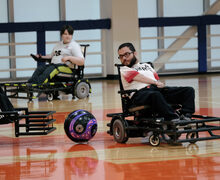Why some SU officials say ‘Student Experience’ working group needs more focus
Daily Orange File Photo
At his inauguration address two years ago, SU Chancellor Kent Syverud said the student experience is "where students live, eat, work, study and interact with each other and the faculty and the community"
Editor’s Note: In Chancellor Kent Syverud’s inauguration address in April 2014, he listed four goals to improve Syracuse University. This series looks at the status of those four goals, two years after the speech.
As the Syracuse University community begins to discuss implementing the Academic Strategic Plan, one working group has the potential to impact every one of the university’s 22,000 students — the group titled the “Student Experience.”
The term is often interchanged by academics and administrative officials with the words undergraduate experience, campus life, student life and other phrases.
About two years ago, while delivering his inauguration address in Hendricks Chapel, Chancellor Kent Syverud boiled the phrase down to a few basic things: “where students live, eat, work, study and interact with each other and the faculty and the community.”
The Student Experience Working Group has plans to look at SU’s campus culture, students’ personal, professional and social developments and other areas. These things make up a “whole student” — a concept that is more possible with university-wide coordination of student services, according to a draft of the Academic Strategic Plan.
But talk to some members of the SU community, and they’ll say the student experience depends on a couple more factors — factors that they feel should be addressed before the Fast Forward Syracuse initiative goes into full effect.
One of those factors is centered around top-down communication. If more updates and information could trickle from up high down to the ground level, SU could be closer to the “one university” administrators, faculty and students alike believe it should be, said Nedda Sarshar, an undergraduate representative on the Board of Trustees.
Universities ignore undergraduates. They ignore them in a really subtle way. It’s like there’s 15,000 (undergraduate) students on this campus and … someone who’s a freshman would say it’s easy to get lost here.Nedda Sarshar
If students aren’t well-informed, Sarshar said it can end up affecting their experience on campus.
The problem is a vicious cycle, wherein students don’t know about certain opportunities, which results in low turnout that the university interprets as disinterest, Sarshar said. Then, the programs sometimes get cut.
What’s often forgotten, she said, is that many changes to student life take time to see. And like most things, it’s a two-way street — where students have to realize that the changes being made actually do affect them personally.
“I see a lot of investment from our administration,” Sarshar said. “You could say that’s because I’m involved, but I do feel that the chancellor and his administration and the people working on the ground do for the most part believe.”
An example of this is the Academic Strategic Plan and the Campus Framework, which Kevin Quinn, SU’s senior vice president of public affairs, said are both aimed at “enhancing” the student experience and campus life.
The framework involves adding new kinds of facilities, as well as improving SU’s “physical character and identity of the campus,” he said.
Thirteen years ago, the university attempted to do virtually the same thing through a Campus Master Plan. The 160-page report begins by detailing the relationship between the physical quality of the campus and the quality of campus life.
“The Campus Plan deliberately sets out to foster collegiality, aiming to create places that … can facilitate human interaction in an increasingly fragmented and complex age,” according to the report.
Patrick Neary, a graduate student and member of the Operational Excellence Steering Committee, said the buildings on SU’s campus serve as good “framing elements” for students in helping them interact with like-minded groups and peers — part of the student experience that Syverud highlighted.
It’s kind of an element to making sure students find a home. The most important part is the people, but it’s important to have facilities to have these things happen in it.Patrick Neary
Senior Vice President and Dean of Division of Student Affairs Rebecca Reed Kantrowitz said the office’s Inclusion, Community and Citizenship division — which includes things like the LGBT Resource Center — serves as a way for students to build and find community.
Neary said it would be helpful if university administrators gave some sort of a timeline and some kind of indication about what the university’s current priorities are and what’s “next up on the list,” he said.
Some issues highlighted by student organizations seem to get lost in a void, said University Senate Student Life Committee Chair Jose Marrero Rosado. What’s more, most student groups don’t have the power to implement changes on campus — they only provide recommendations, Marrero Rosado said.
“When they are brought to light, they stay just as ‘issues that need to be looked at,’” Marrero Rosado said. “There doesn’t seem to be concrete solutions or initiatives happening.”
THE General Body and university administrators proposed a “policy communication strategy” in fall 2014 that would ensure broader communication of policy decisions before they’re made. Neary said a policy like this may be tricky to implement because not all decisions completely impact students. Administrators still need to communicate that students can trust them to create those policies, he added.
“I understand it can be frustrating,” Neary said. “But you have to be able to communicate out, ‘Here’s the policy, here’s the changes and here’s why you should care.’”
The university has created several systems for students to provide feedback: About 22 students serve on Fast Forward committees, 25 students make up the Student Affairs Advisory Board (SAAB) and then there’s long-standing student government bodies such as the Student Association, Graduate Student Organization and the Student Bar Association, among others.
“The dialogue that happens (in the SAAB) not only provides insight to the staff members directly involved in these topics, but also to understanding the holistic student experience,” Kantrowitz said in an email.
Chancellor Kent Syverud said in an interview with The Daily Orange that he hopes the climate survey released this semester will help students communicate their needs to leadership in the administration.
Syverud said he’s also been trying to create a “web of communication” through more direct routes, such as getting university officials to talk with deans and students, as well as inviting student groups to his home throughout the semester.
“But I think the answer is that we all need to be familiar with the student experience — the 360 student experience — not the niche that we see,” Syverud said.
The Academic Strategic Plan proposal also mentioned more collaboration between Academic Affairs and Student Affairs — an improvement that Cathryn Newton, dean emerita of the College of Arts and Sciences, said is essential to improving student life.
We have to think about what are the structures and processes we’ll need in the future for the best possible structure of communication between students, faculty and staff at Syracuse.Cathryn Newton
But student life could also be improved if students understood how the big, sweeping changes happening on campus affect them directly.
Sarshar said she remembers being a freshman several years ago and hearing about former Chancellor Nancy Cantor’s Scholarship in Action initiative. No one knew what exactly it did, yet she said the phrase was repeated often.
Sarshar hopes that the university’s next big phrase, “One University,” doesn’t end up that way — all covered up in red tape, she said.
“It’s going to take revolutionary changes to change that,” Sarshar said. “I think maybe in a couple years, we’ll have a student body that — I don’t want to say will trust — but knows that they won’t be wasting their time if they show up and use the opportunities that the administration provides them.”
Published on April 24, 2016 at 11:09 pm
Contact Annie: [email protected]





